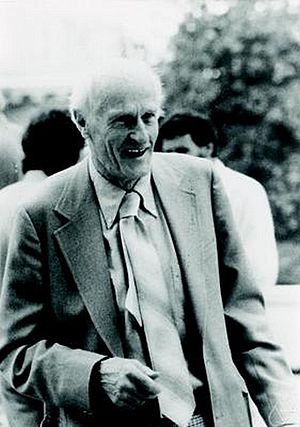Stephen Cole Kleene facts for kids
Quick facts for kids
Stephen Kleene
|
|
|---|---|
 |
|
| Born | January 5, 1909 Hartford, Connecticut, U.S.
|
| Died | January 25, 1994 (aged 85) Madison, Wisconsin, U.S.
|
| Nationality | American |
| Alma mater | Amherst College Princeton University |
| Known for |
|
| Awards | Leroy P. Steele Prize (1983) National Medal of Science (1990) |
| Scientific career | |
| Fields | Mathematics |
| Institutions | University of Wisconsin–Madison |
| Doctoral advisor | Alonzo Church |
| Doctoral students | Robert Constable Joan Moschovakis Yiannis Moschovakis Nels David Nelson Dick de Jongh |
Stephen Cole Kleene (pronounced KLAY-nee) was an important American mathematician. He was born on January 5, 1909, and passed away on January 25, 1994.
Kleene was a student of Alonzo Church. Along with other famous thinkers like Alan Turing, he helped create a field of mathematics called recursion theory. This field is super important because it laid the groundwork for theoretical computer science.
His work helps us understand how computers solve problems. Many mathematical ideas are named after him, like the Kleene star and regular expressions. He also made big contributions to intuitionism, a way of thinking about math.
Contents
Stephen Kleene's Life Story
Stephen Kleene earned his first degree from Amherst College in 1930. He then went on to get his Ph.D. in mathematics from Princeton University in 1934. His main teacher there was Alonzo Church.
In the 1930s, Kleene did key work on something called lambda calculus. This is a system for expressing computation. In 1935, he started working at the University of Wisconsin–Madison. He spent almost his entire career there.
Building Recursion Theory
From 1939 to 1940, Kleene was a visiting scholar at the Institute for Advanced Study. During this time, he started developing recursion theory. This became his main area of research for the rest of his life. Recursion theory helps us understand what can be computed.
In 1941, he taught at Amherst College for a year.
Service During World War II
During World War II, Kleene served in the United States Navy. He was a lieutenant commander. He taught navigation to sailors in New York. Later, he worked on special projects at the Naval Research Laboratory in Washington, D.C..
Return to University of Wisconsin
After the war, Kleene went back to the University of Wisconsin-Madison in 1946. He became a full professor in 1948. He even led the Department of Mathematics for a while. He also chaired the Department of Numerical Analysis, which is now the Department of Computer Science.
Kleene retired from the university in 1979. In 1999, the math library at the university was named in his honor.
Teaching and Key Books
Kleene's teaching at Wisconsin led to three important books on mathematical logic. Two of these books, published in 1952 and 1967, are still used today. In his 1952 book, Kleene wrote simpler ways to understand Gödel's incompleteness theorems. These theorems are very famous in logic.
His book with Richard Vesley, published in 1965, is a classic introduction to intuitionistic logic.
Big Ideas in Computer Science
Kleene's work on recursive function theory is super important for computer science. He discovered many basic ideas in this area. For example, he developed the Kleene normal form theorem in 1936. He also worked on how to interpret intuitionistic statements using a method called recursive realizability.
In 1951, he made a big discovery about how finite automata (simple computing machines) work.
Awards and Personal Life
Kleene was the president of the Association for Symbolic Logic from 1956 to 1958. In 1990, he received the National Medal of Science. This is one of the highest awards a scientist can get in the U.S.
Stephen Kleene and his wife Nancy Elliott had four children. He loved his family farm in Maine. He also enjoyed climbing mountains and cared deeply about nature. He was active in many conservation groups.
Stephen Kleene's Lasting Impact
The Symposium on Logic in Computer Science holds a conference every year. At this event, they give out the Kleene award. This award honors Stephen Cole Kleene and is given to the best student paper.
Important Books by Kleene
- 1952. Introduction to Metamathematics.
- 1967. Mathematical Logic.
See also
 In Spanish: Stephen Kleene para niños
In Spanish: Stephen Kleene para niños
- Kleene–Brouwer order
- Kleene–Rosser paradox
- Kleene's O
- Kleene's T predicate
- List of pioneers in computer science
 | John T. Biggers |
 | Thomas Blackshear |
 | Mark Bradford |
 | Beverly Buchanan |

